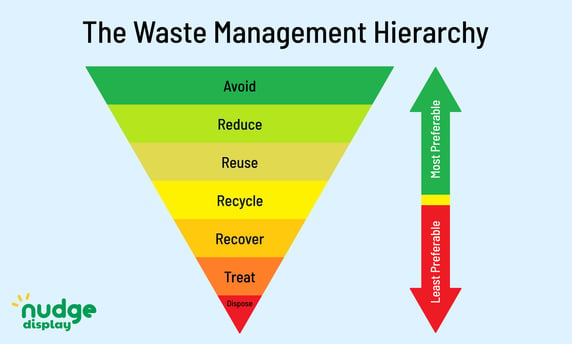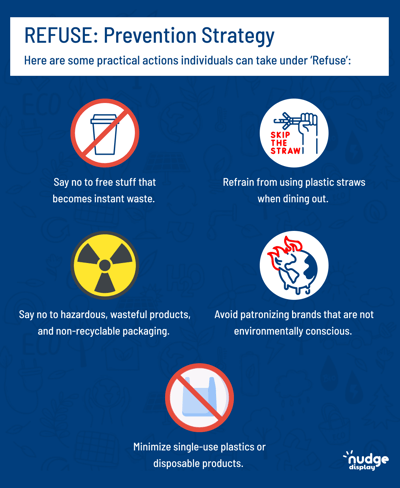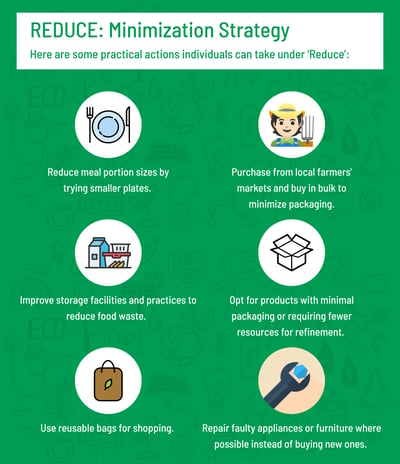Prevention Is Better Than Cure: Leveraging the Waste Management Hierarchy
SUSTAINABILITY3 RS
2/20/20242 min read


In our previous article ‘Nudge Display: Leading Sustainability as a Responsible Producer’, we discussed the UK waste composition and its impact on the environment. Specifically, we highlighted that individual in the UK generates about 465 kg, with 70% (324 kg per person) of this amount ending as residual waste.
Recognizing the negative consequences of ineffective waste management on health and the environment, and as part of our ongoing advocacy for the adoption of a bottom-up strategy in sustainability and climate change policies, this article aims to examine the first two steps of the Waste Management Hierarchy framework, also known as the 5 Rs to identify practical steps individuals can take toward preventing or minimizing household waste.
The 5 Rs – Refuse, Reduce, Reuse, Repurpose, and Recycle, a derivative of the traditional 3 Rs sustainable mantra (Reduce, Reuse, and Recycle) provide a framework for waste management decisions at both the individual and organizational levels, prioritizing what's best for the environment.
REFUSE: Prevention Strategy
The waste management hierarchy prioritizes preventing waste generation, making the Refuse or Prevention strategy the most effective approach. Refusing material is the primary way to directly lower the impact on landfills. Though learning to refuse may take practice, incorporating this step into daily choices is the most effective way to avoid waste from the start. It's about saying “no” to less environmentally friendly options.
Here are some practical actions individuals can take under ‘Refuse’:
Say no to free stuff that becomes instant waste
Say no to hazardous, wasteful products, and non-recyclable packaging.
Refrain from using plastic straws when dining out.
Avoid patronizing brands that are not environmentally conscious.
Minimize single-use plastics or disposable products.




REDUCE: Minimization Strategy
The Reduce Strategy ranks second in effectiveness for minimizing waste. It focuses on reducing consumption or demand for environmentally unfriendly products. Studies show that people often buy more stuff than they need, the Diderot Effect. For instance, research conducted by the Waste and Resource Action Program (WRAP) indicates that UK households throw away 4.7 million tons of food annually, equivalent to 12% of total food purchases. Adopting the Reduce approach not only benefits the environment but also saves costs. According to the WRAP report, the average UK four-person household could save up to £1000 by reducing food waste.
Here are some practical actions individuals can take under ‘Reduce’:
Reduce meal portion sizes by trying smaller plates.
Purchase from local farmers' markets and buy in bulk to minimize packaging.
Improve storage facilities and practices to reduce food waste.
Opt for products with minimal packaging or requiring fewer resources for refinement.
Use reusable bags for shopping.
Repair faulty appliances or furniture where possible instead of buying new ones.
Donate and buy used clothing, furniture, and appliances.
Choose durable items like silverware, reusable cups, and water bottles.
Reduce printing and opt for a "paperless" approach whenever possible.
By adopting these measures and incorporating them into our daily decisions, we all play a role in our endeavour to build a more sustainable and environmentally aware planet.
Terms and Conditions
Copyright 2025. All rights reserved.
